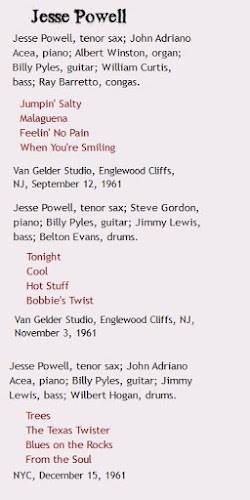LISTEN TO ONE: From the Soul
Tru-Sound was not really a success. Bob Weinstock started it as a showcase for "contemporary rhythm and blues," but there really was no contemporary rhythm and blues in the early 1960s. It was being displaced by funk and soul. Tru-Sound's most successful artist was King Curtis. Juan Amalbert and the Latin Jazz Quintet made a couple of albums for the label. Altogether, Prestige released 14 albums on Tru-Sound between 1961 and 1963, after which it was closed down. Although most of the label's releases fell victim to what appeared to be Weinstock's difficulty in promoting to the rhythm and blues market, they also lived up to his standards for quality, and Jesse Powell was no exception.
Born in Texas in 1924, Powell, after playing some gigs with Louis Armstrong and Luis Russell among others, joined the Count Basie Orchestra in 1946, replacing another Texas tenor man, Illinois Jacquet. He also backed various blues singers, including Champion Jack Dupree and Brownie McGhee, and he played with Dizzy Gillespie. A photo of the Gillespie orchestra at the Apollo in 1949 shows both Powell and John Coltrane in the saxophone section.
In the early 1950s, Powell led his own groups for Federal and Josie, both rhythm and blues labels, and these sessions should settle once and for all whether rhythm and blues is jazz. Backing up singer Fluffy Hunter for Federal in 1951, Powell's band was composed of Buck Clayton (trumpet); J.J. Johnson (trombone); Jesse Powell (tenor sax); Cecil Payne (baritone sax); Bill Doggett (piano); Johnny Jones (guitar); James Smith (bass); Herb Lovelle (drums). And recording a couple of instrumental side for Josie in 1954, he used Sir Charles Thompson (piano / organ); Mickey Baker (guitar); Lloyd Trotman (bass); Osie Johnson (drums). He was in demand as a session man in those years, appearing on such hits as "Speedoo" by the Cadillacs for Josie, "Mr. Lee" by the Bobettes for Atlantic, and several of Bobby Darin's hits for Atlantic subsidiary Atco.
John Adriano Acea (listed on the session notes as Adiano Acea) played on the September 12 and December 15 sessions. He had started out playing trumpet and saxophone, and he was said to have been proficient on any instrument there was, but he concentrated on piano after getting out of the army in 1946. Like Powell, he got a lot of work as a session man in New York, often recording as Johnny Acea or John Acea. He was featured on albums by Grant Green, Joe Newman, Illinois Jacquet, Eddie "Lockjaw" Davis. Don Wilkerson and others, played with Dizzy Gillespie, and accompanied Gloria Lynne, Diana Washington, Ruth Brown and Patti Page. He worked rhythm and blues and doowop sessions for independent labels in New York and Philadelphia. Never in good health (doctors told his parents he would not survive his childhood), he died not long after these sessions, in 1963.
Albert Winston, playing organ on the September session, was primarily known as a bass player. He recorded with Archie Shepp and George Benson among others, and was active in the rhythm and blues scene, including work with pre-Specialty Little Richard and Johnny Ace.
Billy Pyles played on all three sessions. I couldn't find much about him, but he had some solid rhythm and blues sessions for Specialty artists, including Little Richard.
Bassist William Curtis only played on the September session, and I was unable to find any information on him. Equally elusive was Steve Gordon, who played piano on the November session, a particularly tricky search in that there seem to be a plethora of pianists named Steve Gordon.
Jimmy Lewis (November and December) and Belton Evans (December), are familiar names on Prestige recordings.
Wilbert Hogan (December) played on a 1956 Prestige session with Earl Coleman, as Wilbur Hogan. But that only scratches the surface of his name variations. Born Wilbert Granville Thodore Hogan Jr., he sometimes recorded as Granville Hogan, and sometimes used the initials G. T. He was active from the early 1950s (originally with Earl Bostic) through tzhe 1960s, and played with Randy Weston, Kenny Drew, Kenny Dorham, Ray Charles, Elmo Hope, Bud Powell and Walter Bishop Jr.
Unusually for a rhythm and blues combo, the September session did not use a drummer. They had Ray Barretto on congas. although it wasn't a Latin session. They did one Latin tune, "Malaguena," but not with an especially Latin rendition.
All three sessions were included on a single album, It's Party Time. Three 45 RPM singles were released, all on Tru-Sound: "Jumpin' Salty/Malaguena," "When You're Smiling/Hot Stuff," and "Cool/Tonight."
Maybe between November and December the Prestige brain trust had cooled on Powell. The December session wasn't recorded at Rudy Van Gelder's, and no singles were released from it. It's also interesting that in 1962, with the twist craze in full bloom, neither of the "twist" titles were released on 45;
A lot of the information on Jesse Powell comes from an invaluable resource: A History of Tenor Saxophone Solos 1955-2015, by John Laughter.


1 comment:
Love his style! Thanks for the history!
Post a Comment